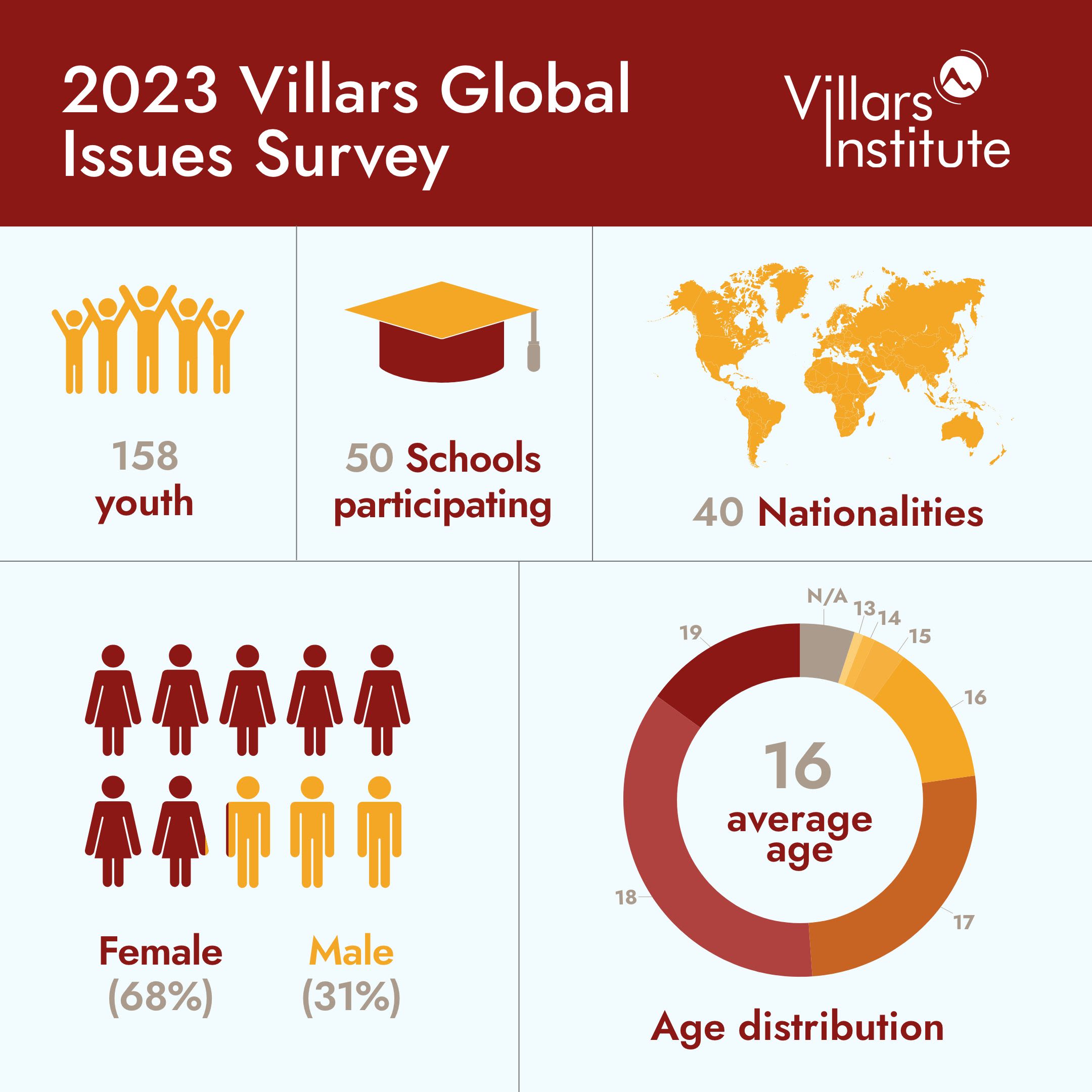There are 1.3 billion adolescents in the world today, who make up 16% of the 8 billion people on our planet. The expectation is that the younger generation will prove more active, productive and innovative when it comes to improving the state of the world. Yet, we give scant attention to the opinion of youth surrounding the global issues shaping our planet’s future.
Climate change and biodiversity loss are global challenges that the adolescent population (defined by the UN as those between the ages of 10 and 19) will have to manage in their daily lives and future careers. As it stands, they face severe intergenerational disparities, particularly in the context of climate change. In fact, a 2022 study estimated that children will face far more heatwaves, droughts, floods and wildfires than their grandparents.
As Youth Advisor of The Villars Institute, my focus is on understanding how youth perceive the importance and impact of global issues on their future work or career and in their daily lives. This is an important distinction as it’s unlikely that every young person will pursue a career directly linked to climate change or biodiversity loss. However, every member of my – and future – generations will have their lives shaped by these and other global issues, whether they like it or not.
Simply put, we live in an interconnected and interdependent world. This is why the Villars Global Issues Survey examines youth perceptions about six important topics that will shape their future and the future of our planet. The six global issues include: planetary health; net-zero and nature positive economy; energy transition; nature-based solutions; emerging technologies; and systems thinking and systems leadership. Our aim is to catalyse public debate by highlighting the importance and impact of these six global issues across generations and by emphasising the need for greater intergenerational collaboration.
We surveyed over 150 youth representing more than 50 schools and 40 nationalities worldwide. All of the respondents are part of the Villars Fellowship program, with an average age of 16. They were asked how six global issues will shape their work or career and their daily life in the next five to 10 years. We wanted to test the media’s perception that youth sentiment is that of anger and “eco-anxiety” and to challenge the narrative of “chronic fear of environmental doom”. We also found that existing youth surveys about global issues often ignore how these issues will influence future education, career and lifestyle choices.
That’s why we decided to go one step further than traditional youth climate surveys, and explore the elements that make up the entirety of youth opinions. Unlike other surveys, we aren’t just looking at the potential impact on work or career – we are also interested in the impact on their daily life. We understand that business must change, but so must consumer behaviour – and the reality is that not everyone will have the option, or willingness, to work in a profession or industry that is directly linked to achieving net-zero carbon emissions, or to preventing biodiversity loss.
In January this year, I was invited to attend and speak at the World Economic Forum’s Annual Meeting in Davos, Switzerland. I joined a panel at the Open Forum, Protecting the Climate Vulnerable, where I announced our plans for the Villars Global Issues Survey.
Participants were struck by the fact that almost 80% of respondents believe that each of these six global issues will be either very important or absolutely essential in their work or career in the next five to 10 years.
Just as interesting was that around 80% believe that these issues will have the same impact in their daily life as in their future career. Key from this is to consider that, compared with older generations, today’s youth believe global issues will not only impact their work or career, but will also have a significant impact in their daily lives.Notably, only 2% believe the six issues will be of little importance in their work or career and just 3% believe they will have a slight impact on their daily life.
It is worth observing the difference in perceived importance and impact of these issues on career and daily life. For example, 36% believe Systems Leadership will be absolutely essential in their work or career in the next five to 10 years, compared with just 26% who think Systems Thinking will have the same impact in their daily life in the next five to 10 years.
Similarly, 33% of youth surveyed think the concept of Planetary Health will be absolutely essential in their work or career in the next five to 10 years, however, 43% believe Planetary Health will be extremely impactful in their daily life in the next five to 10 years.
Understanding why there are gaps between the perceived impact on future work versus the impact on daily life will be important for educators and employers, which is why we are excited to continue this research annually, tracking how opinions might change over time and increasing the number of respondents globally each year.
An important part of our Survey asked participants what they would like to learn about each of the six global issues.
Better understanding of practical day-to-day solutions on the individual level was a common theme. Global issues, particularly climate change, can easily become overwhelming for individuals - more so for young people who will inherit the consequences of today’s decisions - so it is understandable that youth are looking for realistic and manageable solutions that they can easily apply in their everyday life.
Respondents also showed interest in the application of systems thinking and systems leadership across disciplines, for example, environmental economics and sciences, and to learn more about this interconnectedness that underpins the concept of systems thinking.
Under planetary health and planetary boundaries, there were a number of responses suggesting youth would like to learn more about the basics of these themes - what they are, where we are at, and where we’re headed. For those with some understanding, there was curiosity around particular planetary boundaries such as Novel Entities. It is clear from the responses that many young people share the belief that such global themes, in particular, planetary health, should be included in the school curriculum.
Another common theme across the six issues and participants’ responses is how to have a positive impact in these areas within business. What actions can young entrepreneurs take to have a positive impact on, for example, planetary health?
Participants also shared that they are interested in learning how they can contribute as a youth to a net-zero and nature positive economy, and how they can become more involved in the decision making processes that will directly impact their future. There was an appetite for learning more about renewable energy sources and possible career paths within these fields, as well as companies and initiatives to support.
Similarly, under the theme of energy transition, respondents are curious about the economic feasibility of the transition, particularly for low-income households, and the technology required to get us there. Some were particularly keen on learning more about nuclear energy and the potential for nuclear to support the global economy in its transition to net-zero emissions.
Some interesting responses under nature-based solutions and emerging technology included interest in learning more about biotechnology, particularly biomimicry, and food systems.
We are on an irreversible path to further global warming. Our best hope is to limit warming to under 2°C and aim for 1.5°C, if that is still possible. Despite this, I am not pessimistic – instead, I am encouraged by the results of our first survey.
I believe that for the world’s youth, the most important thing we can do as individuals is to explore and express our unique gifts and passions for the benefit of others. We all have the potential to contribute our own individual gifts to a collective effort to address global warming.
I am a stubborn optimist, and I believe that humanity – and in particular, our youth – has the ability and intelligence to address any challenge – including the climate crisis. Humans created the problem, we have the capacity and the creativity to mitigate it.





